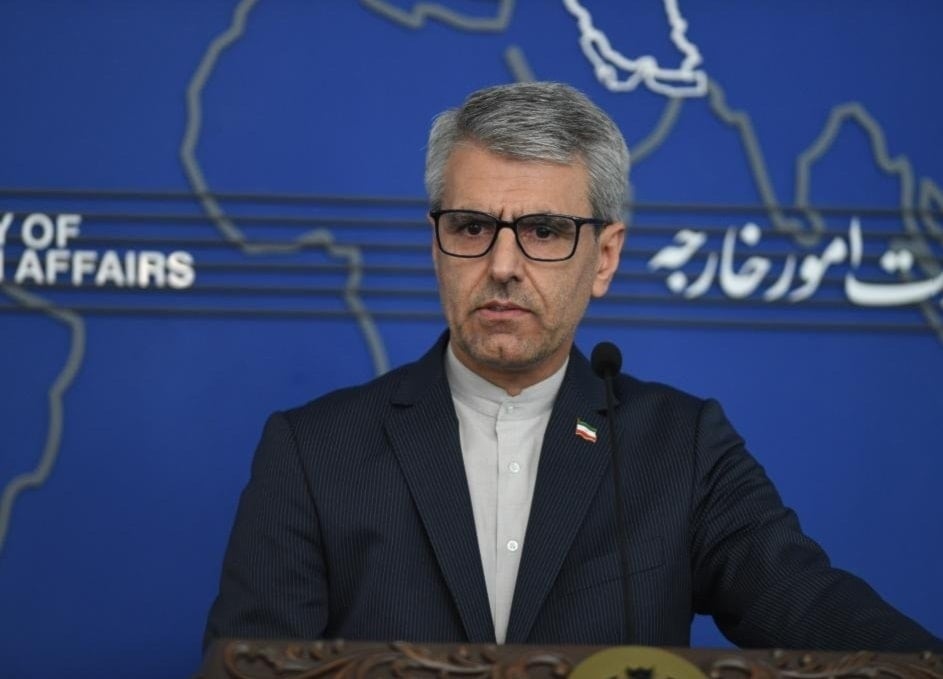Tehran warns world to be wary of repeated Israeli ceasefire breaches
Iran reaffirmed its support for efforts to end the war in Gaza while urging the international community to remain vigilant against potential Israeli violations of the newly brokered ceasefire.
-

Iranian Foreign Ministry Spokesman Esmaeil Baghaei attends a press conference in Tehran, Iran, on May 5, 2025. (Xinhua)
Iran has reiterated its firm backing for all initiatives aimed at halting the ongoing "massacre and genocide" in Gaza, while warning that "Israel's" record of breaking commitments requires close international attention.
Speaking at a weekly press briefing on Monday, Foreign Ministry spokesperson Esmaeil Baghaei said Tehran's central demand is an end to "Israel's" crimes and blockade against Gaza, alongside the urgent delivery of humanitarian aid to its besieged population.
"The experience in our region over the past few decades, including the Zionist regime's ... lack of commitment and the frequent violations of the ceasefire in Lebanon, with more than 4,500 cases of ceasefire violations, requires those who are concerned about peace to be vigilant so that the [Israeli] regime will not repeat its long-standing habit of breaking promises and committing criminal acts," he stated.
Baghaei said the recent ceasefire between Hamas and "Israel" was the outcome of 700 days of relentless bombardment and starvation inflicted on the Gaza Strip. He confirmed that Iran had clearly outlined its position on the ceasefire agreement, noting that the war in occupied Palestine must ultimately end.
"Iran ... can both counter any threat appropriately and create an opportunity from within a challenge," he added, emphasizing Tehran's readiness to navigate the evolving regional landscape.
Fragile truce tested
The ceasefire, which took effect Friday morning, is part of a 20-point peace plan brokered by US President Donald Trump, with subsequent phases still under negotiation. The deal's implementation has become a central focus of the Gaza summit in Egypt, where Trump will be attending alongside Egyptian President Abdel Fattah el-Sisi and other world leaders. The meeting in Sharm el-Sheikh is expected to define monitoring mechanisms and address post-war reconstruction in Gaza.
However, new tensions have already surfaced. Israeli Security Minister Israel Katz announced that the army has been instructed to prepare for the demolition of tunnels throughout Gaza, a move he described as part of post-conflict demilitarization efforts. Katz said the operation would be carried out "directly by the [IOF] and through the international mechanism to be established under US leadership and supervision."
The declaration has sparked fears of renewed hostilities, with analysts warning that large-scale tunnel demolition could be seen as a unilateral military act and a potential breach of the ceasefire. Hamas has rejected any disarmament demands, insisting that it will not surrender weapons until a sovereign Palestinian state is realized.
Enduring instability
Against this backdrop, Baghaei argued that the Israeli occupation and the oppression of Palestinians remain the root cause of instability in the Middle East.
"The Tel Aviv regime has subjected Palestinians to oppression since its inception and even before that, starting from 1947 and earlier," he said. "Therefore, as long as ... the realization of the Palestinian people's right to self-determination is not addressed, we will unfortunately continue to witness problems in the region and, somehow at the global level."
Lasting peace, Baghei says, hinges on restoring Palestinian rights and ending the decades-long occupation that has perpetuated humanitarian crises and recurring wars.
Read more: New report details extensive Israeli arson in Gaza after ceasefire

 3 Min Read
3 Min Read









